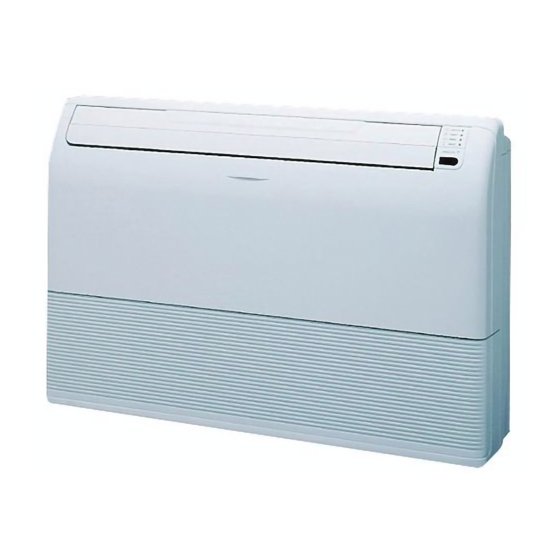Fujitsu ABT series 운영 매뉴얼 - 페이지 2
{카테고리_이름} Fujitsu ABT series에 대한 운영 매뉴얼을 온라인으로 검색하거나 PDF를 다운로드하세요. Fujitsu ABT series 18 페이지. Floor console/under ceiling dual type
Fujitsu ABT series에 대해서도 마찬가지입니다: 운영 매뉴얼 (20 페이지), 운영 매뉴얼 (20 페이지), 운영 매뉴얼 (20 페이지)

CONTENTS
SAFETY PRECAUTIONS ........................................ 1
FEATURES AND FUNCTIONS ............................... 2
NAME OF PARTS ................................................... 3
PREPARATION ....................................................... 5
OPERATION ........................................................... 6
TIMER OPERATION ............................................... 8
SLEEP TIMER OPERATION .................................... 9
AIR CIRCULATION ............................................... 10
SAFETY PRECAUTIONS
G Before using the appliance, read these "PRECAUTIONS" thoroughly and operate in the correct way.
G The instructions in this section all relate to safety; be sure to maintain safe operating conditions.
G "DANGER", "WARNING" and "CAUTION" have the following meanings in these instructions:
DANGER!
WARNING!
CAUTION!
DANGER!
CAUTION!
1
This mark indicates procedures which, if improperly performed, are most likely to
result in the death of or serious injury to the user or service personnel.
This mark indicates procedures which, if improperly performed, might lead to the
death or serious injury of the user.
This mark indicates procedures which, if improperly performed, might possibly result
in personal harm to the user, or damage to property.
G Do not attempt to install this air conditioner by yourself.
G This unit contains no user-serviceable parts. Always consult authorized service per-
sonnel for repairs.
G When moving, consult authorized service personnel for disconnection and installa-
tion of the unit.
G Do not become over-exposed to cold air by staying in the direct path of the airflow of
the air conditioner for extended periods of time.
G Do not insert fingers or objects into the outlet port or intake grilles.
G Do not start and stop air conditioner operation by turning off the electrical breaker
and so on.
G In the event of a malfunction (burning smell, etc.), immediately stop operation, turn
off the electrical breaker, and consult authorized service personnel.
G Provide occasional ventilation during use.
G Do not direct air flow at fireplaces or heating apparatus.
G Do not climb on, or place objects on, the air conditioner.
G Do not hang objects from the indoor unit.
G Do not set flower vases or water containers on top of air conditioners.
G Do not expose the air conditioner directly to water.
G Do not operate the air conditioner with wet hands.
G Turn off power source when not using the unit for extended periods.
G Always turn off the electrical breaker whenever cleaning the air conditioner or chang-
ing the air filter.
G Connection valves become hot during Heating; handle with care.
G Check the condition of the installation stand for damage.
G Do not place animals or plants in the direct path of the air flow.
G When restarting after a long period of disuse in the winter, turn the power switch on
at least 12 hours before starting the unit.
G Do not drink the water drained from the air conditioner.
G Do not use in applications involving the storage of foods, plants or animals, precision
equipment, or art works.
G Do not apply any heavy pressure to radiator fins.
G Operate only with air filters installed.
G Do not block or cover the intake grille and outlet port.
G Ensure that any electronic equipment is at least one metre away from either the in-
door or outdoor units.
G Avoid installing the air conditioner near a fireplace or other heating apparatus.
G When installing the indoor and outdoor units, take precautions to prevent access by infants.
G Do not use inflammable gases near the air conditioner.
SWING OPERATION ........................................... 11
MANUAL AUTO OPERATION ............................. 12
CLEANING AND CARE ........................................ 12
SIGNAL CODE ..................................................... 13
TROUBLESHOOTING .......................................... 14
OPERATING TIPS ................................................. 15
TEMPERATURE AND HUMIDITY RANGE .......... 17
